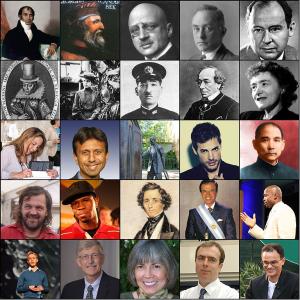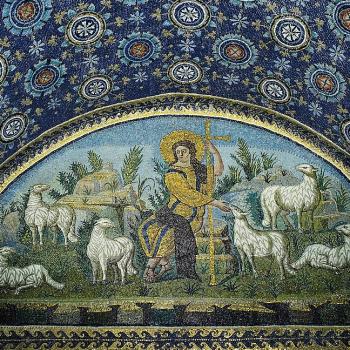
The Christian faith is a missionary faith; Christians are expected to be ambassadors of Christ, sharing the good news and love of God with everyone. To do this right requires a delicate balance. Christians should hope others will come to know and experience God’s love for themselves, that is, to believe and find their life transformed by the grace and God. But they must also make sure they do not engage others merely out of the basis to convert them to the Christian faith, rather, they should embrace others out of love, care for them and their own dignity, whether or not they are Christian, whether or not they are interested in learning about the Christian faith. They need to give others their own agency. This is why, when they serve as witnesses to Christ, they must do so in the proper method, that is, they must not try to spread the Christian faith through proselytism. If their methods go against the way of love, against the way Jesus presented, they are not really serving God; most likely, they are serving themselves, seeking to gain something personally as a result of their actions instead of being truly concerned about the person they are talking to.[1]
One way of proselytism is to use the conversion of high profile figures in society, trying to encourage others to convert to the faith because they did. There are many dangers in this method, among which, it can turn the Christian faith into a fad, but also, it promotes new converts, those who have not yet been tried and tested as Christians, those who have not yet had the time to grow in their faith, let alone to study and better understand the teaching of the Christian faith, and turn them into spokespersons for the faith: whatever erroneous misconceptions of the faith they have will become a part of their message, and as a result, more and more people will be led away from the purity of the faith and into various potential heretical beliefs and unorthodox practices. This is especially true if the high-profile convert is known for holding to and promoting various ideologies which run contrary to the teachings of the Christian faith, ideologies which they have not repudiated during their conversion, but rather use their conversion to promote. This is the trouble many find with the so-called right-wing pipeline to the Catholic faith in the United States, as we find many political figures who have harsh views against migrants and the poor continue to promote such ideologies after their supposed conversion; when they are challenged by the church, and the Pope, to change their views and actions, they not only ignore such pleas, they double-down on their ideology and encourage other Catholics to do likewise (up to the point of attacking the Pope). This should not be surprising, because this has been common throughout history: high profile, rich, perhaps intelligent converts have been known to use their status with the hope of changing the church and its teachings instead of being changed by its teachings, and in doing so, form various heresies, taking many others with them in their heresy.[2]
Even in the first century, Christians began to see the potential problems of having converts quickly brought into positions of power and authority in the church. They came to see that converts had to be tried and tested, to prove conversion would last, and that any misunderstanding they had of the faith had was dealt with, before converts were seen as ready to take on such positions or become teachers who proclaimed the faith to others. Even St. Paul had to tested and prove himself before the church accepted his apostolic calling.
When Christians found themselves under suspicion by Rome, and later, arrested and sometimes executed for being Christian, the conversion process itself changed. They were expected to undergo a period of many years as catechumens, learning about the faith and making sure their way of life conformed with the expectations the church had for them. The church wanted to make sure they were faithful, and not spies from the Roman government, or someone whose conversion as half-hearted and would quickly lose interest in it and lapse from the faith as quickly as they joined it.
Christians understood conversion was a good thing, but the conversion had to be tried and proved true. If someone was a long-standing catechumen, someone who had a long association with the faith, and only waited to be baptized, they could have proven themselves faithful during their catechumen period and be elevated to a position of authority as soon as they were baptized (which sometimes happened, like with St. Ambrose). What was key was to make sure converts had an authentic conversion and that they had sufficient knowledge to represent the church before they became a high-profile representative of the faith. Scripture, also, indicated this was the way, as it said those who were to be elevated to the bishopric, someone with authority in the church, should not be someone who was a recent convert or someone who was self-absorbed, but rather, someone who has proven themselves to be of sound mind and character: “He must not be a recent convert, or he may be puffed up with conceit and fall into the condemnation of the devil; moreover he must be well thought of by outsiders, or he may fall into reproach and the snare of the devil” (1 Tim. 3:6-7 RSV). We should take the spirit in which this was written, and apply it to anyone who would desire to become a high-profile representative of the Christian faith. They should not be new to the faith, nor someone whose way of life, or whose ideology, would bring scandal to the church. This is why converts who come from a highly tainted ideological background, or have done all kinds of questionable things right before their conversion, should not be turned into instant spokesmen and women for the faith. They should prove their conversion by showing a change in their thinking and in their actions, even as they should prove they are sorry for the evil which they have done, not only by acknowledging it, but doing what they can to heal the harm their actions have caused.
There will be many converts who do not fully convert to the Christian faith, but because of their presence and voice, their ideologies and ways will become the way non-Christians view the faith. Many Christians, upon seeing this, and seeing them promoted, will begin to question and doubt their faith, even as those who stand against such ideologies, upon seeing them as being treated as a part of the Gospel message, will only see the Christian faith as something to avoid.
Thus, it is not just the scandal that they bring, but the lack of actual care for the souls of such converts, which demonstrates the problem behind the promotion of celebrity conversions, using such celebrities as instant spokesmen and women for the faith. This is especially true when such a celebrity joins in the church hoping to promote and reinforce their ideologies, which is what we see happening with many figures from the American political right. It is hard to tell how many of them are real converts, and how many see religion as a tool for power. In either situation, they are not tried and tested. They are not shown the errors of their ideologies but told they can hold onto them, even to the point of criticizing the church for its teachings when its teachings, such as those on social justice, repudiate their ideologies. In this fashion, they end up becoming a vessel for an anti-Christian agenda, using the Christian name for that agenda.
Yes, we should, as Rebecca Bratten Weiss pointed out, welcome converts, but we must do so in an authentic way, not allowing converts see conversion as a mere career move:
Anyone joining a faith community should be welcomed with open arms, of course, but when celebrity converts are given special treatment, and fawned upon, this again runs counter to the teachings of Jesus, who viewed all people as equally sacred, and taught that the “last shall be first” and “the meek shall inherit the earth.” When joining the church becomes a way to earn extra fame and fortune, conversion to Catholicism can almost look like a career move.[3]
Indeed, it does the converts well to make sure they are tested and tried, and have their faith and actions purified, for otherwise, even if they might have come in with some faith, and so do some good with that faith, in the end, their bad catechesis and lack of proper metanoia will cause them harm:
Many have accomplished mighty acts, raised the dead, toiled for the conversion of the erring, and have wrought great wonders; and by their hands they have led many to the knowledge of God. Yet after these things, these same men who quickened others, fell into vile and abominable passions and slew themselves, becoming a stumbling-block for many when their acts were made manifest. For they were still sickly in soul. But instead of caring for their souls’ health, they committed themselves to the seal of this world in order to heal the souls of others, being yet ill in health; and, in the manner I have stated, they have lost their souls and fell away from their hope in God. [4]
[1] What it is they seek to gain can differ; some people just want to be praised, but others look to use converts as a power base which they can use, either within the church, or in the world (such as in and with politics).
[2] Marcion is a prime example of this, as, after he converted, he used his resources to influence the church, but when he found the church teaching views he despised, he tried to take over the church from within.
[3] Rebecca Bratten Weiss, “Conversion To Catholicism Shouldn’t Be A Right-wing Power Play” in National Catholic Reporter (12-19-2022).
[4] Saint Isaac the Syrian, The Ascetical Homilies of Saint Isaac the Syrian. Trans. Monks of the Holy Transfiguration Monastery. Rev. 2nd ed (Boston, MA: Holy Transfiguration Monastery, 2011), 145 [Homily 4].
Stay in touch! Like A Little Bit of Nothing on Facebook.
If you liked what you read, please consider sharing it with your friends and family!
N.B.: While I read comments to moderate them, I rarely respond to them. If I don’t respond to your comment directly, don’t assume I am unthankful for it. I appreciate it. But I want readers to feel free to ask questions, and hopefully, dialogue with each other. I have shared what I wanted to say, though some responses will get a brief reply by me, or, if I find it interesting and something I can engage fully, as the foundation for another post. I have had many posts inspired or improved upon thanks to my readers.















